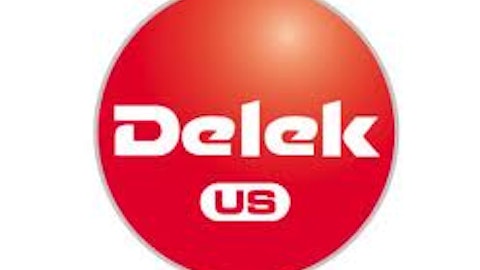Western Refining, Inc. (NYSE:WNR) is a small, often overlooked refiner that operates primarily in the oil-soaked markets of Texas and the American Southwest. Although the company rarely attracts attention from high-flying fund managers or Wall Street analysts, it is noteworthy for several reasons. For starters, it has a solid dividend yield of 1.5 percent and recently issued a $1 special dividend that amounted to a 5 percent payout at the time. Moreover, the company’s stock price has appreciated dramatically over the past several years. Many “momentum investors” have bet heavily on Western Refining, Inc. (NYSE:WNR)’s ability to continue its strong performance.
On the other hand, this company is not without its problems. Its stock appears to have made a medium-term peak and may be locked in a downtrend. To make matters worse, a large insider sale recently attracted unwanted attention and led market-watchers to call a top in the company’s stock. Before investors hop into this seemingly undervalued company, they should take a closer look at its finances and strategic position.
Recent Price Performance
Alon, Valero Energy Corporation (NYSE:VLO) and Western Refining, Inc. (NYSE:WNR) have all appreciated by at least 100 percent over the past 18 months. This is largely the result of the underlying strength of the energy market and the broad-based rise in prices for equities over time. Since refining stocks tend to rise and fall in near-unison, it can be difficult to find patterns that differentiate individual names from one another. To make matters worse, it is difficult to say whether Western is truly undervalued. Despite outward appearances, the company’s P/E ratio of 8.5 and price-to-book ratio of 2.9 are not particularly noteworthy. For its part, Valero Energy Corporation (NYSE:VLO) has a P/E figure of 7.1 and a price-to-book ratio of 1.2. Alon has a P/E ratio of 11.4 and a price-to-book figure of 1.9.
Yield and Special Dividend
Western Refining, Inc. (NYSE:WNR) has been fairly good to its shareholders. In anticipation of changes to American tax statutes at the start of 2013, the company issued a 5 percent special dividend in December of 2012. It continues to maintain an attractive payout ratio as well. However, its less-than-ideal cash position makes wholesale dividend increases unlikely in the near future.
Western Refining vs. Other American Refiners
Western Refining, Inc. (NYSE:WNR) competes with a number of recognizable refining companies that share its geographical and strategic areas of operation. These firms include Dallas-based Alon USA Energy, Inc. (NYSE:ALJ) and San Antonio-based Valero Energy Corporation (NYSE:VLO).
Valero Energy Corporation (NYSE:VLO) is far larger than either of its lesser-known competitors. Its market capitalization of nearly $22 billion exceeds that of Western Refining by a factor of nine and dwarfs that of Alon USA Energy, Inc. (NYSE:ALJ) by a factor of 20. Meanwhile, Valero earned about $3.2 billion on revenues of over $136 billion. This compares with earnings of just $157 million on revenues of $7.8 billion for Alon and earnings of $533 million on revenues of $9.4 billion for Western. Although its profit margin is not eye-popping, Western is clearly the most profitable of these three firms. It should be noted that the refining business can be a very low-margin affair.
Unsurprisingly, all three of these companies have substantial but manageable debt loads. Alon has about $2 in debt for every $1 in cash, Western has about $3 in debt for every $1 in cash, and Valero Energy Corporation (NYSE:VLO) has about $3.50 in debt for each cash dollar on its books. All three firms have levered free cash flow figures that seem adequate to replenish their reserves.
Short Interest and Insider Selling
On the other hand, a major Western Refining shareholder recently pocketed more than $8 million by cashing out of a 250,000-share position. The attendant transactions occurred during the first quarter of 2013 and came near the top of the company’s aggressive run-up. At an average sale price of over $32 per share, it is likely that the insider pocketed a tremendous profit as a result of this deal. Investors who ascribe weight to insider sales would do well to watch Western for additional transactions of this nature.
It is also important to note that Western has a substantial amount of short interest. This has worried formerly bullish market-watchers and lends credence to the thesis that Western has reached a medium-term share-price top. The scope of the short interest in this company cannot be understated: At last count, more than 16 percent of the company’s float consisted of short-held shares. Needless to say, this could have major implications for the firm’s short-term stock-price movements.
Invest or Avoid?
On paper, Western Refining looks like a great value. However, it has a few notable drawbacks. In the end, investors must assess their own appetite for risk before initiating a long or short position in this company. Those who believe that Western stands to benefit from rising refining margins and other potential tailwinds may wish to initiate a long position at these levels. Those who remain skeptical about the company’s prospects might countenance a short position instead. However, high short interest and a cheap valuation could conspire to produce a classic short squeeze at any time.
In sum, this stock bears watching. Despite Western’s apparent value, the most cautious investors may wish to avoid the name for now. More aggressive longs can find ample justification to add to their positions at these levels. Likewise, short-side traders will find plenty to like here as well. Given the inherent risks of a long or short position in a stock like this, independent research is strongly advised.
The article With Absurd Discount, Solid Yield and Industry Tailwinds, Is This A Steal? originally appeared on Fool.com and is written by Mike Thiessen.
Mike is a member of The Motley Fool Blog Network — entries represent the personal opinion of the blogger and are not formally edited.
Copyright © 1995 – 2013 The Motley Fool, LLC. All rights reserved. The Motley Fool has a disclosure policy.





